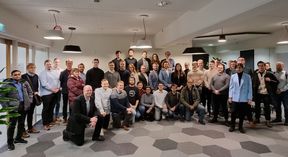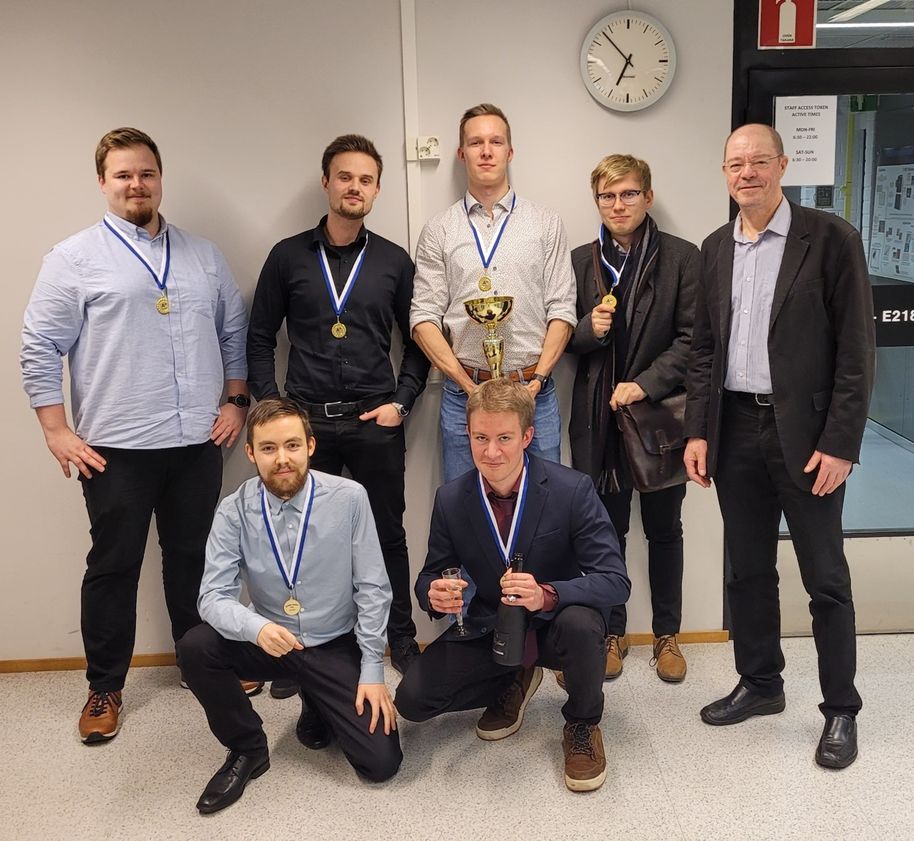Chemical engineering design project brings mutual benefit to companies and students

The Design project in chemical engineering lets groups of students draft a preliminary implementation plan on topics offered by companies collaborating in the course.
Course participants learn about the acquisition of source data, practical process planning and dimensioning of equipment, safety, and aspects of sustainable development, as well as the evaluation of costs and profitability and putting forward the results of design work. Another goal is to seek out and utilise new ideas.
The course began already in the 1990s with a focus on factory design, but it took on its current form in 2016 when Professor Pekka Oinas took the reins. Oinas revised the course, adding to it an authentic business dimension alongside the design work.
‘The students on the course work as if they were employed by an actual company. The goal of the design project is to produce genuine value added for companies, be it economic, or connected with protecting the environment’, Oinas explains.
Companies are involved in the design course as advisers and directors. The project work is set up around a challenge assigned by the companies, and the students can design the process to solve the challenge. Also taking part in the guidance of the student groups are Aalto University personnel: lecturers, researchers, and graduate students of factory design. Companies taking part in the project course of 2023 included AFRY, Andritz, Fazer, Kemira, Metso, and Neste.
‘Over the years dozens of Finnish industrial companies have brought their issues before this course, and hundreds of process engineers who have completed the course are now employed by Finnish companies. This helps provide a foundation for continued collaboration between the School of Chemical Engineering and the industry, and the development of that collaboration’ Oinas points out.
The course has traditionally been very popular, as companies usually find that they the student projects bring them great benefit.
‘The goal of the companies in this course is to make a preliminary evaluation of the Techno-economic assessment (TEA) of new processes. The work of some groups has led to further collaboration in the form of corporate investment projects’, Oinas says.
Pekka OinasThe goal of the design project is to produce genuine value added for companies.
Management experience in an authentic project environment
Over the years students at other Aalto schools have also taken part in the project courses of the School of Chemical Engineering. Scheduling pressures, chairing meetings, and the existence of real responsibility make the course demanding for the students. Each of the members of the groups work as project heads, gaining management experience in an environment resembling actual work.
Aleksi Toivanen, a master's student in chemical engineering, worked in the Fazer group during the course. In contrast to other student groups, members of Toivanen's group did not swap tasks during the project – instead, Toivanen served as the head of the project throughout the entire course.
Toivanen chaired meetings, scheduled projects, and sought to keep the outcome of the work as consistent as possible. This allowed each member of the group to focus on honing their own skills and knowledge according to their own professional interests.
‘Few courses involve such lengthy group work. Although I have known the members of my factory design project for years, the duration of the project calls for a different approach than the group work of the courses of normal duration does. A year of intense collaboration requires perseverance, nerves, and good communication skills’, Toivanen says.
Toivanen adds that the factory design project is on a par with very real projects, based on its duration alone. Factory design projects are exceptional exercises in a school environment, because there is no single right solution to situations offered by the companies, contrary to what is often the case in homework and exams.
‘I learned most about scheduling design work and communications outside the project group. Arranging meetings proved to be an excellent learning opportunity, and I feel that my entire group learned the most from talking to the directors of the school and the firm’, Toivanen says.
Versatile practical learning about process design
Students on the course are mostly master's students but the course sometimes also includes students who are academically more advanced. Doctoral researcher Sahar Babaeipour provided her own group with expertise and skills linked with laboratory tests on practices of sustainable development.
During the course Babaeipour was responsible for matters including the design of a fermentation process and other related processes, mass balance calculations, safety evaluations, and the visualisation of business models.
The project course gave Babaeipour valuable management experience, while increasing her understanding of the central aspects of process design, and a command of the basic level of simulation tools. Babaeipour also found the close collaboration with corporate representatives to be of significance.
‘Interaction with real customers was an important part of the course, as it gave us experience in managing dynamic expectations, adhering to deadlines, and adapting to standards in the field. Exposure to the limitations of the real world sharpened my problem-solving skills while expanding my understanding of the field of chemical engineering’, Babaeipour says.
Neste group produced valuable background information for companies
The topic for the Neste group was the production of monomers from biologically based raw materials. According to Neste senior researcher Jukka Hietala, the topic has been previously studied only from the point of view of catalysis. Hietala proposed including the topic for the course as a kind of short-cut for finding out what the process could primarily look like and if it might be economically feasible.
In addition to Hietala, participants from Neste also included process design specialist Joonas Hyvärinen, as well as Anja Leminen, who is familiar with profitability evaluation, and process engineer Kia Lehti.
The initial setup visualised for the project soon proved to be too broad and the work was scaled back to apply to only the first part of a two-phase reaction, where renewable raw material is catalytically fragmented as an intermediate product.
‘The Aalto group quickly recognised several technical bottlenecks and factors that raised costs. They made a factory design for the basic concept and evaluated it. They saw that the investment was very risky, but in addition, as a free-time hobby of sorts, they also developed an improved version. As the work called for designing only one factory, that version was added as an appendix to the work’, Hietala says.
According to Hietala, the work of the students yielded extremely valuable background information if Neste decides to continue the development of the concept.
‘If it is implemented, this would be a completely new product and largely a new technology, and therefore, it will have to be examined many times within the company before it can see the light of day. In any case, thanks to the Aalto design project we made a great leap in the understanding of this topic’, Hietala says.
Andritz familiarised students with the pulp industry
The topic of the Andritz group was ‘Recovery of alcohols in the shunt of a pulp mill’. A process was designed for a pulp mill and the tasks of Andritz included familiarising students with processes in the pulp industry. Serving as instructors from Andritz were Development Engineer Aino Pesola and Juha Pohjantähti, the Head of Process Development.
‘In the course we were able to give advice on, for example, process design and calculating profitability to help the students move forward in their work. For our part, the course included project discussions, examining results, commenting on reports, arranging excursions, and naturally, participation in seminars’, Aino Pesola says.
According to Pesola, the course was clearly beneficial for Andritz – collaboration with universities and students usually leads to new ideas and innovations.
‘Participating in the course got us acquainted with educational programmes and students, and we also got to see what kinds of skills and knowledge the students have. These courses also provide a good path for getting students to know our company better and to find motivated producers of master's theses, or permanent employees’, Pesola says.
The course, which extends from March to December, culminates in a ‘Design Project Gala’ event in late November and early December, where the student groups present the results of their design work. In the final evening event, the groups compete for a prize. This year's winner was the Neste design group.
Read more about the course: Design Project in Chemical Engineering | Aalto University

Read more news

Alum Ding Ma: 'I want to represent a new-era Mayor'
Ding Ma, who will start as the Mayor of Savonlinna at the age of 37, studied Information and Service Management at the School of Business.
OpenLearning additional maintenace downtime on Wednesday, 11 March from 9:00 AM to 12
The system will be unavailable during the update.
The proxy server for remote access to e-resources is changing
If you have problems using e-resources, try accessing the e-resource using VPN connection.






